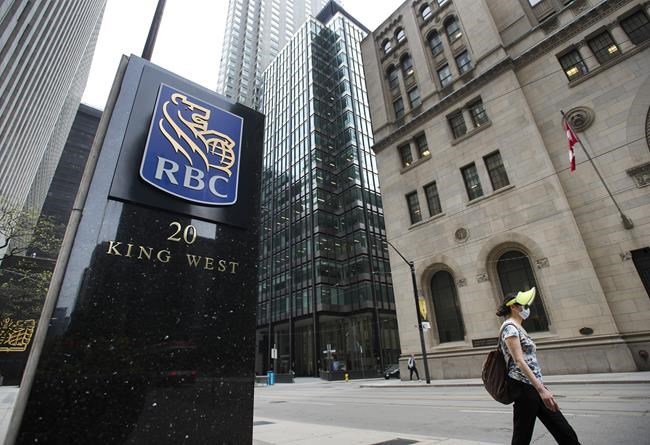TORONTO — Three promising COVID-19 vaccine candidates may have spurred optimism from investors, but Royal Bank of Canada's chief executive is warning the country is not rid of its pandemic troubles yet.
Dave McKay told analysts Wednesday that the economy could still suffer some blows as the globe grapples with uncertainty around how soon people will be injected with Pfizer, Moderna and AstraZeneca's vaccines.
"The economy has rebounded well to date," he said on a call to discuss the bank's fourth-quarter earnings.
"But given the emergence of the second wave of COVID-19 in our core markets, we expect economic growth to slip over the next couple of quarters and project Canadian economic growth to end 2020 down over 5 per cent."
McKay projected that economic growth could rebound by between 4 and 5 per cent, but likely not until 2021.
His outlook is less rosy than some of his banking counterparts, who said on Tuesday they were cautiously optimistic about the economy's future.
Bank of Nova Scotia chief executive Brian Porter said the economy was looking up because government relief programs had pushed retail spending back to pre-pandemic levels, helped housing market growth and triggered a recovery in auto sales.
"There’s good reason to be optimistic about the associated economic recovery accelerating as 2021 progresses,” BMO Financial Group chief executive Darryl White added.
McKay's warnings come even as his bank beat analyst expectations and managed to report higher fourth-quarter profits than those prior to the pandemic.
The bank said it earned nearly $3.25 billion or $2.23 per diluted share for the quarter ended Oct. 31, up from nearly $3.21 billion or $2.18 per diluted share a year earlier.
On an adjusted basis, RBC says it earned $2.27 per diluted share for its latest quarter, up from an adjusted profit of $2.22 per diluted share a year ago.
Analysts on average had expected an adjusted profit of $2.05 per share, according to financial data firm Refinitiv.
Revenue totalled $11.09 billion, down from $11.37 billion in the same quarter last year.
RBC's successes were largely due to its ability to use gains in its capital markets business to offset lower interest rates, client deposit revenue and. results in its personal and commercial banking and wealth management businesses.
Looking at its full year, the bank's personal and commercial banking sector saw earnings slip by 21 per cent and in wealth management they fell by 13 per cent, but RBC saw growth in the insurance and investor services areas.
Given the uncertainty of the pandemic, the bank was keen to keep spending in line as much as possible.
Expenses fell 4 per cent year over year and in most areas remained "relatively flat or down from last year," McKay said.
The bank also took the quarter as a chance to ease up on the amount of money it reserves to cover bad loans.
After putting away $1.11 billion in the second quarter and $675 million in the third quarter, McKay said the bank only had to dedicate $427 million for provisions for credit losses in the latest quarter.
That was down from $499 million a year ago and followed a strategy also being used at Scotiabank and BMO, which announced Tuesday that they too had reduced their provisions for credit losses.
The wind down signals that some government relief programs and billions in loan deferrals and fee abatements from banks have worked to mitigate risks associated with the pandemic.
RBC said it had offered deferrals on more than $90 billion of loans and seen long-term interest rates edge up, but McKay feels short-term interest rates will remain low for "an extended period."
When combined with elevated levels of fiscal stimulus, the rates provide a buffer for customers to manage risk, but he indicated that won't help everyone.
"While the majority of clients have returned to making payments on their loans, some will experience further difficulties with the effects of the second wave," McKay said.
Predicting how significant an impact the second wave and fiscal stimulus will have on the ability of Canadians to deal with financial troubles is tough, said National Bank of Canada when it too released earnings on Wednesday.
The bank said its profit for the quarter ended Oct. 31 amounted to $492 million or $1.36 per diluted share, down from a profit of $604 million or $1.67 per diluted share a year ago.
Revenue hit $2 billion in the quarter, up from $1.91 billion in the same quarter last year.
"It is not possible to predict the full impacts that this pandemic will have on the global economy, financial markets and the bank," National said in a release.
"The actual impacts will depend on future events that are highly uncertain and cannot be predicted with any certainty, including the extent, severity and duration of the COVID-19 pandemic, as well as the effectiveness of actions and measures taken by governments, monetary authorities and regulators over the long term."
This report by The Canadian Press was first published Dec. 2, 2020.
Companies in this story: (TSX:RY, TSX:BNS, TSX:BMO, TSX:NA)
Tara Deschamps, The Canadian Press



